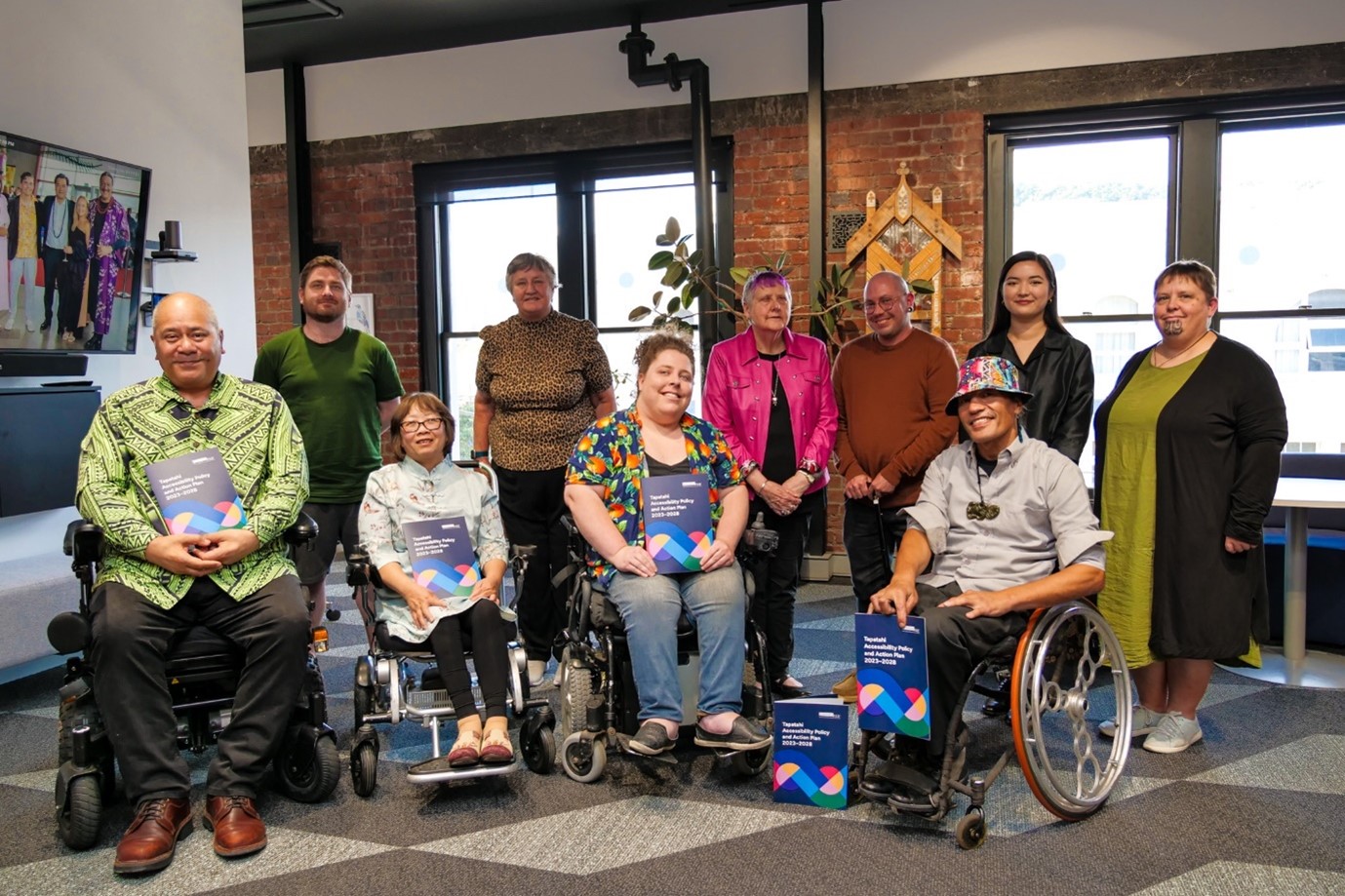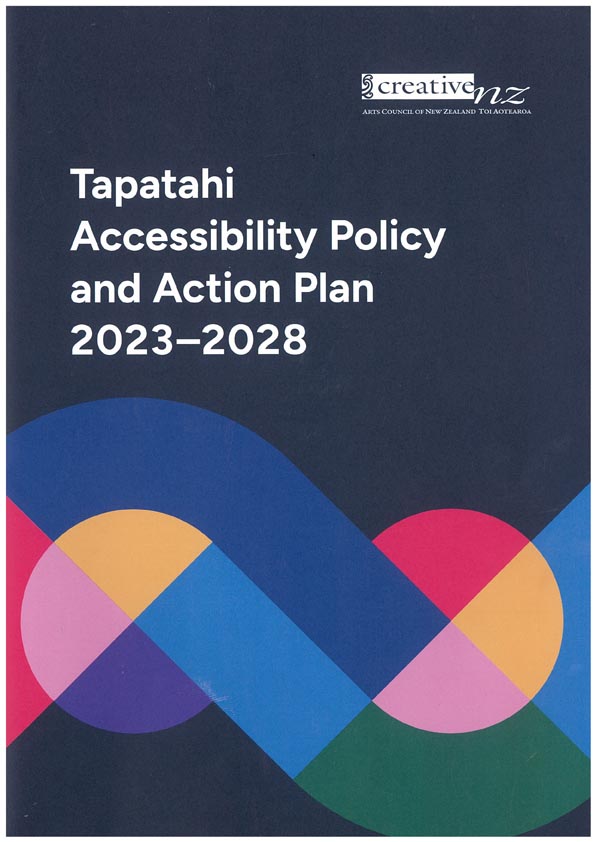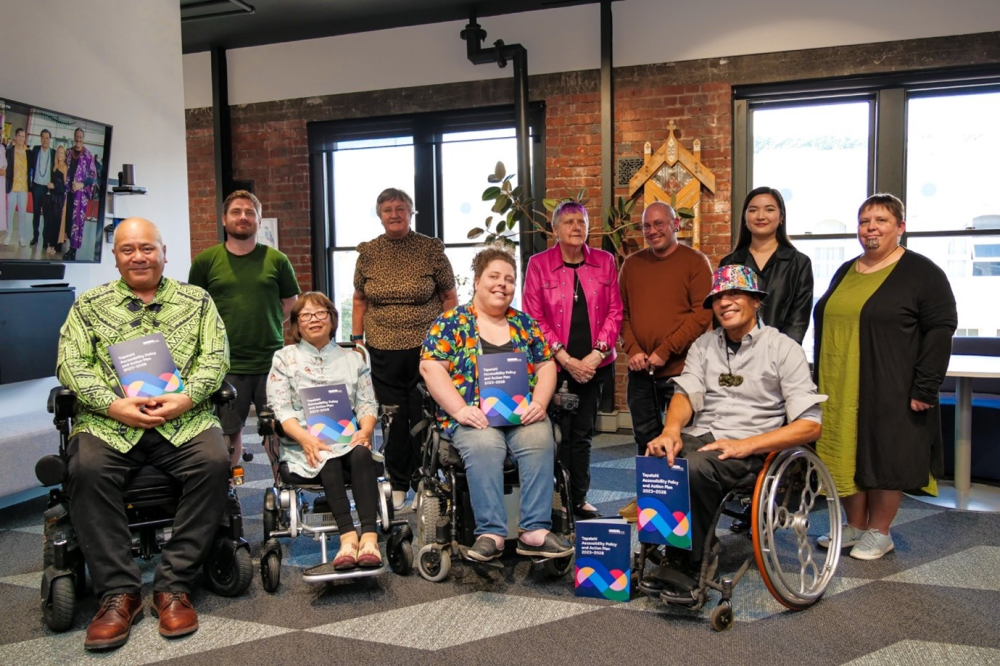
Members of Manga Tipua Deaf and disabled-led Accessibility Reference Group, from left to right: Pati Umaga, Callum McMenamin, Yi Liang Small (meeting assistant, People First), Sharyn Newton, Erin Gough (co-chair), Robyn Hunt (Arts Council member), Stace Robertson (Specialist Advisor, Arts Access Aotearoa), Rodney Bell (Ngāti Maniapoto, co-chair), Cadence Chung, Kellye Bensley. Members not included in the photo: Rāhera Turner (co-chair), Jelly O'Shea, Pelenakeke Brown, Lagi Thompson-Rikys, Susan Williams
Launched today, the Tapatahi Accessibility Policy and Action Plan 2023 – 2028, is a guide for Creative New Zealand and outlines the ways it will work inclusively for all New Zealanders, with a focus on Deaf and disabled artists and arts practitioners, turi Māori (Māori Deaf), tāngata whaikaha Māori (disabled Māori) and disability communities.
 To develop the policy, Creative New Zealand worked with Manga Tipua, a reference group of Deaf and disabled artists, policy and disability rights advocates to understand and address barriers and access issues in Creative New Zealand’s services, information and funding.
To develop the policy, Creative New Zealand worked with Manga Tipua, a reference group of Deaf and disabled artists, policy and disability rights advocates to understand and address barriers and access issues in Creative New Zealand’s services, information and funding.
The co-design approach was instrumental in creating a process that demonstrated a commitment to equity, Deaf and disabled leadership, value and integrity – the four principles that underpin the policy.
Stace Robertson, Lead Accessibility Advisor at Arts Access Aotearoa and a specialist advisor to Manga Tipua, says the policy recognises the contribution that Deaf and disabled artists make to the arts sector, and will open doors to new artistic opportunities.
“This policy represents a cultural shift for Creative New Zealand and sets new ways of working,” he says. “It’s been a huge privilege to support this process over the past two years, and I appreciate the care and consideration Creative New Zealand staff have taken. They understand the importance of this policy and have worked hard to build valuable relationships with the community.”
Kellye Bensley, member of Manga Tipua, says, “This accessibility policy from Creative New Zealand is important because it is designed by tāngata whaikaha and turi whānau. I think it is the perfect role model for accessibility in terms of creating – if a policy is made together, in partnership, then it achieves access for all people.”
Taking time to develop an accessibility policy
Erin Gough, co-chair of Manga Tipua, recommends that organisations wanting to create an accessibility policy take their time.
“Be led by the people in the group. And how they want to work – it may not fit within your perceived timelines, but the end result will be worth it,” says Gough.
Rodney Bell, co-chair of Manga Tipua, says the policy is about learning from each other.
“What I am hoping the accessibility policy achieves is discovery. For us to discover a way forward is to acknowledge the old, and to shift our consciousness to being more collaborative in relationship to what access for all means,” he says.
This policy is a big step in the right direction, says Chief Executive Stephen Wainwright.
“Our partnership with Deaf and disabled artists, disability rights advocates and leaders to develop the policy has been crucial in achieving a policy that we feel confident will guide us to be a truly inclusive and approachable organisation for New Zealanders,” he says.
The purpose of the policy is twofold: to assist Creative New Zealand internally and the broader arts ecology who want to do better in this space; and to serve as a starting point to encourage conversations and action from organisations wishing to improve their accessibility.
The policy actions and promotes the vision of the New Zealand Disability Strategy. The seven-point action plan ensures effective and positive change will be implemented across Creative New Zealand.
Implemented changes
Changes implemented to date include:
- ensuring Creative New Zealand’s website, funding portal and funding processes are accessible and inclusive and can be accessed by people using assistive technologies such as screen-readers
- supporting anyone who applies for funding and needs support to make an application through our Supported Application Service
- providing an additional $5000 towards access costs on top of funding awarded to Deaf and disabled artists, or those who experience disability or impairment, under specific funds
- providing a range of communication options for people to get in touch with our funding advisers
- using plain language in all our written communications and publishing our key research and organisational documents in alternative formats
- continuing to work in partnership with Manga Tipua other key organisations to ensure we have Deaf and disabled leadership across our mahi and specialist Deaf and disability knowledge.



